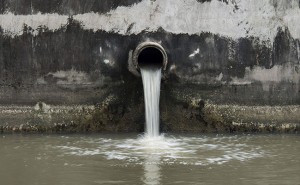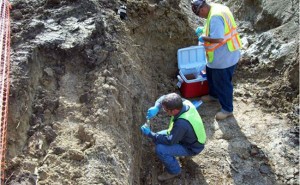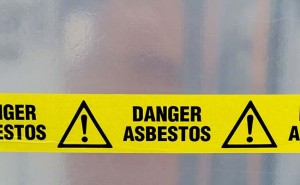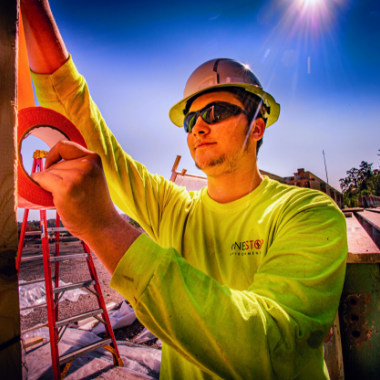Need to perform due diligence on one or more properties? Our environmental site assessments can help you understand your existing — and potential — liabilities.
We offer both Phase I and Phase II assessments, using in-depth site investigation, personal interviews and historical research to uncover contamination problems on any given site. Just as importantly, we’ll give you detailed options for addressing those problems — helping you either minimize the likelihood of problems recurring, or prevent their recurrence altogether.
We use the standards set by ASTM International (formerly known as American Society for Testing and Materials) to prepare our reports, and we tailor our research to focus on your specific concerns and objectives.
It’s no secret that increased public concern for the environment has driven expansions in the number and scope of compliance requirements across all regulatory channels. We help both federal and private clients keep on top of — and maintain compliance with — all current environmental laws, standards and regulations.
Our experienced professionals constantly monitor updates in environmental laws and requirements — giving us ongoing expertise in helping you develop and implement sound compliance strategies.
Here are a few ways we can help:
Managing your monitoring programs
Performing calculations and validating data for compliance with all reporting levels
Generating routine compliance reports for regulators
Our comprehensive environmental compliance services include:
- Comprehensive Environmental Response, Compensation, and Liability Act (CERCLA)
- Hazardous and Solid Wastes
- Lead, Asbestos, and PCB Management
- Water Quality Regulations and Permits
- Above ground Storage Tank Requirements
- Underground Storage Tank Requirements
- Air Emissions Permitting/Clean Air Act Compliance
- Hazardous Materials Management
- Hazard Communication and Reporting
- Natural and Cultural Resource Protection Laws
- National Environmental Policy Act (NEPA)
- Environmental Management Strategies
- Environmental Regulatory Horizon
 Environmental permitting is a central component in keeping our clients — both federal and private — in compliance with environmental regulations.
Environmental permitting is a central component in keeping our clients — both federal and private — in compliance with environmental regulations.
We routinely navigate complex permitting processes for clients. We can help your facility apply to establish a new permit, or renew an existing one. Moreover, we have the knowledge and experience to streamline the permitting process — ensuring that your time and resources are managed efficiently.
Our team has experience establishing the following environmental permits:
NPDES Permit
According to the EPA, “The Clean Water Act prohibits anybody from discharging ‘pollutants’ through a ‘point source’ into a ‘water of the United States’ unless they have an NPDES permit.
“The permit will contain limits on what you can discharge, monitoring and reporting requirements, and other provisions to ensure that the discharge does not hurt water quality or people’s health.
In essence, the permit translates general requirements of the Clean Water Act into specific provisions tailored to the operations of each person discharging pollutants.”
EPA ID Number
The EPA’s website states, “Federal regulations require large and small quantity generators of hazardous waste to obtain an EPA Identification (EPA ID) number using EPA Form 8700-12 and to submit the completed form to the authorized state agency or EPA regional office if the state is not authorized to implement the Resource Conservation and Recovery Act Subtitle C program.”
Our environmental permitting team can help you determine if you are required to obtain the federal ID number or if you are subject to state-specific reporting requirements.
Title V Air Permit
Congress established the Title V Operating Permit program as part of the 1990 Clean Air Act Amendments. The Operating Permit Program ensures that air quality control requirements are in place and met.
Click Here to see who is required to obtain a Title V Air Permit.
 We offer both Phase I and Phase II assessments, using in-depth site investigation, personal interviews and historical research to uncover contamination problems on any given site.
We offer both Phase I and Phase II assessments, using in-depth site investigation, personal interviews and historical research to uncover contamination problems on any given site.
Just as importantly, we’ll offer detailed options for addressing those problems — helping you either minimize the likelihood of problems recurring, or prevent their recurrence altogether.
We use the standards set by ASTM International (formerly known as American Society for Testing and Materials) to prepare our reports, and we tailor our research to focus on your specific concerns and objectives. Ultimately, our due diligence can give you liability protection under the ASTM 1527 standard.
We’ve conducted site assessments for the following entities:
- Banks
- Commercial Realtors
- Federal Government
- Property Development
Tight deadline? We’ll handle it.
Even if you’ve waited until the very last minute to schedule Phase I and Phase II environmental site assessments, call us.
What is a Phase I Environmental Site Assessment?
It starts with our team of environmental consultants reviewing site records, and performing a site inspection — conducting interviews with owners, occupants, neighbors and local government officials.
Depending on the results of the Phase I ESA, we may recommend a Phase II, outlining additional site investigation needs.
When is a Phase II Environmental Site Assessment advisable?
If a Phase I ESA identifies potential contamination of the site by hazardous materials, we’ll recommend conducting a Phase II ESA.
A Phase II ESA includes sampling and laboratory analysis to confirm the presence of hazardous materials. Depending on the results of the samples, the Phase II ESA should outline additional site investigation needs and potential remedial actions that may be required to clean up the property.
Some of the tests we may perform include:
- Drum sampling (if any were left on the property)
- Surficial soil and water samples
- Sampling of dry wells, floor drains and catch basins
- Testing of underground storage tanks
- Subsurface soil borings
- Groundwater monitoring well installation, sampling and analysis*
- Transformer/capacitor sampling for Polychlorinated Biphenyls (PCBs)
- Geophysical testing for buried tanks and drums
- Asbestos, lead and other regulated material testing
Depending on our test results, a Phase II ESA will likely outline additional site investigation needs — as well as potential remedial actions that may be required to clean up a property
* Groundwater monitoring, etc, may also be appropriate on neighboring properties, to determine if contamination has spread.
 Knowledge of the material itself is critical to the quality of an asbestos survey. Moreover, the better and more accurate the survey, the more cost-effective and suitable your control measures will be in reducing possible exposure to airborne asbestos fibers.
Knowledge of the material itself is critical to the quality of an asbestos survey. Moreover, the better and more accurate the survey, the more cost-effective and suitable your control measures will be in reducing possible exposure to airborne asbestos fibers.
We map-out exactly where the material is located throughout your building. Our experienced technicians precisely determine the location, type, quantity, and condition of the asbestos in your facility — so that it can be safely managed.
Whether you want to selectively remove asbestos prior to renovating, remove as much as possible before demolition, or just know what kind of hazards might be present in your facility, we’ll create an objective-specific survey you can rely on.
Should your survey indicate the need for removal, we also offer complete asbestos abatement services.




